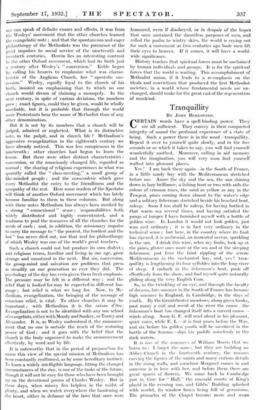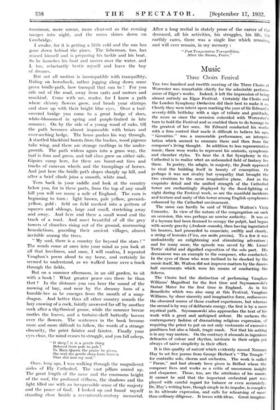Tranquillity
BY JOHN BERESFORD.
CERTAIN words have a spell-binding power. They are all sufficient. They convey in their compacted integrity of sound the profound experience of a state of being. Such a power there is in the word—tranquillity. Repeat it over to yourself quite slowly, and in the five Seconds or so which it takes to say, you will find yourself wonderfully soothed. Moreover, calling in aid memory and the imagination, you will very soon find yourself wafted into pleasant places.
Yes ! I am back there again—in the South of France, in a little sandy bay with the Mediterranean stretched before me-. Azure the sky and the sea, the sun shining down in lazy brilliance, a fishing boat or two with sails the colour of crimson roses, the sand as yellow as any in the Tempest, pines coming down almost to the water's edge and a solitary fisherman stretched beside his beached boat, asleep. Soon I too shall he asleep, for having bathed in that warm sea several times, and having satisfied the pangs of hunger I have furnished myself with a bottle of golden wine. In London it would not look golden, just wan and ordinary ; it is in fact very ordinary in the technical sense ; but here, in the country where its fruit has ripened, it is ambrosial, an immortal nectar, sparkling in the sun. I drink this wine, relax my limbs, look up at the pines, glance once more at the sea and at the sleeping fisherman, just hear the faint rippling of the serene Mediterranean in the enchanted bay, and, yes ! tran- quillity is lengthening its four syllables into the long river of sleep. I embark in the fisherman's boat, push off effortlessly from the shore, and find myself quite naturally gliding along the very English Cam.
So, in the twinkling of an eye, and through the faculty of dreams, late summer in the South of France has become high summer in England, in Cambridge, in the days of youth. By the Grantchester meadows, along green banks, past many a coil and recoil of the river the canoe—the fisherman's boat has changed itself into a curved canoe— winds along. Soon G. F. will read aloud in his pleasant, quiet voice, while E. L.—it is four years- before the War, and six before his golden youth will be sacrificed in the battle of the Somme—dips his paddle noiselessly in the dark waters.
It is one of the romances of William Morris that we listen to : I forget the name, but they are building an Abbey-Church in the fourteenth century, the masons carving the figures of the saints and many curious details in the rising walls, and somehow Margaret comes in and someone is in love with her, and before them there are great spaces of flowers. We come back to Cambridge just in time for " Hall," the emerald courts of King's placid in the evening sun, and Gibbs' Building splashed with scarlet, its window boxes being full of geraniums. The pinnacles of the Chapel become more and mora enormous, more serene, more clear-cut as the evening merges into night, and the moon shines down on Cambridge. I awake, for it is getting a little cold and the sun has gone down behind the pines. The. fisherman, too, has roused himself and is preparing his tackle and his boat. So he launches his boat and moves over the water, and I, too, reluctantly bestir myself and leave the bay of dreams.
But not all motion is incompatible with tranquillity: Riding on horseback, rather jogging along down some green bridle-path, how tranquil that can be ! For you ride out of the road, away from carts and motors and mankind. Come with me, reader, for I know a path where chicory flowers grow, and brush your stirrups and stare up with their bright blue eyes. Over a turf- covered bridge you come to a great hedge of sloes, white-blossomed in spring and purple-fruited in late summer. On by the side of a young wood of oaks, till the path becomes almost impassable with briars and over-arching hedge. The horse pushes his way through. A startled blackbird bursts from the bushes, wood pigeons take wing, and there are strange rustlings in the under- growth. The path widens again into a grass way, the turf is firm and green, and tall elms grow on either side. Gipsies camp here, for there are burnt-out fires and tracks of caravan wheels and the tramplings of horses. And just here the bridle path slopes sharply up hill, and after a brief climb joins a smooth, white road.
Turn back in your saddle and look at the country below, you, for in these parts, from the top of any small bill you will see many a mile of England. The corn is beginning to turn : light brown, pale yellow, greenish- yellow, gold : field on field marked into a pattern of squares and oblongs, large and small, stretching away and away. And here and there a small wood and the track of a road. And most beautiful of all the grey towers of churches rising out of the ground, murmuring benedictions, guarding their ancient villages, almost invisible among the trees.
" My soul, there is a country far beyond the stars ! " The words come at once into your mind as you look at all that loveliness, and once, I will confess, I repeated Vaughan's poem aloud to my horse, and certainly he seemed to understand, as we walked home over a track through the fields.
But on a summer afternoon, in an old garden, to sit with a book ! What greater peace can there be than that ? In the distance you can hear the sound of the mowing of hay, and near by the dreamy hum of a bumble-bee as he emerges from the mouth of a snap- dragon. And better than all other country sounds the lazy crowing of a cock, faintly answered far off by another cock after a rhythmical pause, while the summer breeze rustles the leaves, and a tortoise-shell butterfly hovers over the flowers. The sentences in the book become more and more difficult to follow, the words of a strange obscurity, the print fainter and fainter. Finally your eyes close, the mind ceases to struggle, and you fall asleep.
" 0 sleep ! it is a gentle thing
Beloved from pole to pole ! To Mary-Queen the praise be given, She sent the gentle sleep from heaven That slid into my soul."
Once, long ago, I was walking through the magnificent aisles of Ely Cathedral. The vast pillars soared up. The great length of the nave and the enormous height of the roof, the profound stillness, the shadows and the light filled me with an inexpressible sense of the majesty and the peace of God. I looked up and found myself standing close beside a seventeenth-century memorial. After a long recital in stately prose of the career of the deceased, all his activities, his struggles, his life, his earthly cares, there was a single line which remains, and will ever remain, in my memory :
" Poet Tempestatem Tranquillitas. After the Storm, Peace."































 Previous page
Previous page